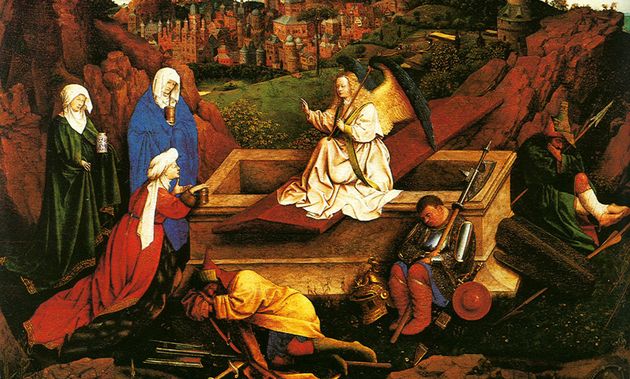
A common misunderstanding of Christianity views it as nothing more than belief in a series of abstract truths regarding a God who is one and three, a person who is God and man, and bread that is no longer bread. However, the more theological dimensions of these articles of faith were only fully worked out centuries after the Apostles first preached. They were present from the beginning, no doubt, although in more implicit articulation. They are indeed integral parts of an organic whole, but they came later in the growth of that whole, as flowers and fruits come later in the life of a newly sprouted tree. The roots and trunk come first.
The roots, in this case, were understood by the followers of Christ not to be rarefied teachings, but to be consequences of a fact. Christianity stands or falls on the truth of an empirical fact. All later magisterial and theological elaborations arise from that fact, harken back to that fact, and point tirelessly towards that fact; without it they become empty puffs of air. “If Christ has not been raised, then our preaching is in vain and your faith is in vain,” as St. Paul bluntly put it. (1 Cor. 15,14) But what exactly does this mean?
The Paschal Mystery of Christ’s Death and Resurrection has, from the beginning, been understood to be a factual mystery, and no vague or theosophical symbol. Christians believe that Christ really did physically die (contrary to the suggestion of some Muslims that his death was faked), and thereafter that he really did physically rise from the dead (contrary to modernist notions of a mere “spiritual” restoration). The denial of either of these facts drains the very meaning out of Easter, demoting the two most concrete and historically rooted realities of all time into ashen metaphors of supposedly otherworldly truths. Another world is involved indeed. But the focus of the Paschal Mystery lies in a truth about this world and how it was changed forever when invaded by that other world. That invasion rewrote this world’s tragic human story into the unprecedented narration of a Divine Comedy.
The blessed bombshell of this happening should not be underestimated. Imagine a person you knew and loved, but who – as happens to all of us sooner or later – has sadly passed away. Now, recall how they were when alive and vibrant, with blood in their cheeks and a twinkle in their eye. Next, imagine them now motionless and pale in their coffin. So far this is the story we know only too well. But now let us imagine that same person – a day or two after the funeral, while you are still in the midst of almost unbearable grief – suddenly walking through the front door of your house and kissing you on the cheek.
Once you had overcome initial doubt – maybe walking around them a time or two, pinching their flesh and checking their breath – you would hardly be inclined to utter abstractions or engage in metaphysical speculations. You would feel instead that something had just changed forever in your life. Furthermore, you would be unable to refrain from telling everyone about what you had just experienced. The most dreaded bogeyman of all – death – would have just been delivered a dramatic setback, and a universe of once fixed and fated meanings would have been turned upside down.
Now that was the first experience of the content of Christian witness – a witness to the death and resurrection of a man known and loved by many. And it was an ignominious and unmistakable death, as definitive as the crushing of a bug under the sole of your shoe. It had been witnessed and bewailed by a multitude of spectators, only to be abruptly reversed and transcended before their very eyes.

What was witnessed here was the intrusion of a higher Life into this world of inevitable death. But this was no mere “spiritual” renewal, no mere emancipation of a rarefied spirit from the prison of the dark world of matter. Instead, this was an emphatic and bodily reboot: molecules and cells called into a new order of being. Countless Christians have preferred being tortured, or even killed, rather than denying witness to this massively improbable event. Nothing like this had happened since the first “Let there be light!” of Genesis.
St. Paul was certainly one of the most cultured and intelligent men of his times. In today’s terms, he would have the equivalent of doctorates in philosophy, theology and exegesis. But Saul of Tarsus only became Paul of the Gospel after something had impinged upon his life for which no course of study could have remotely prepared him. The encounter with the Resurrected Christ bowled him over, and he never got over it. The fountainhead of all Christian faith, and the source of its most sublime and carefully articulated theology – dogmatic, moral, ascetical and mystical – lies in the permanent and ever-growing wonder of never getting over the empirical fact of Easter.



